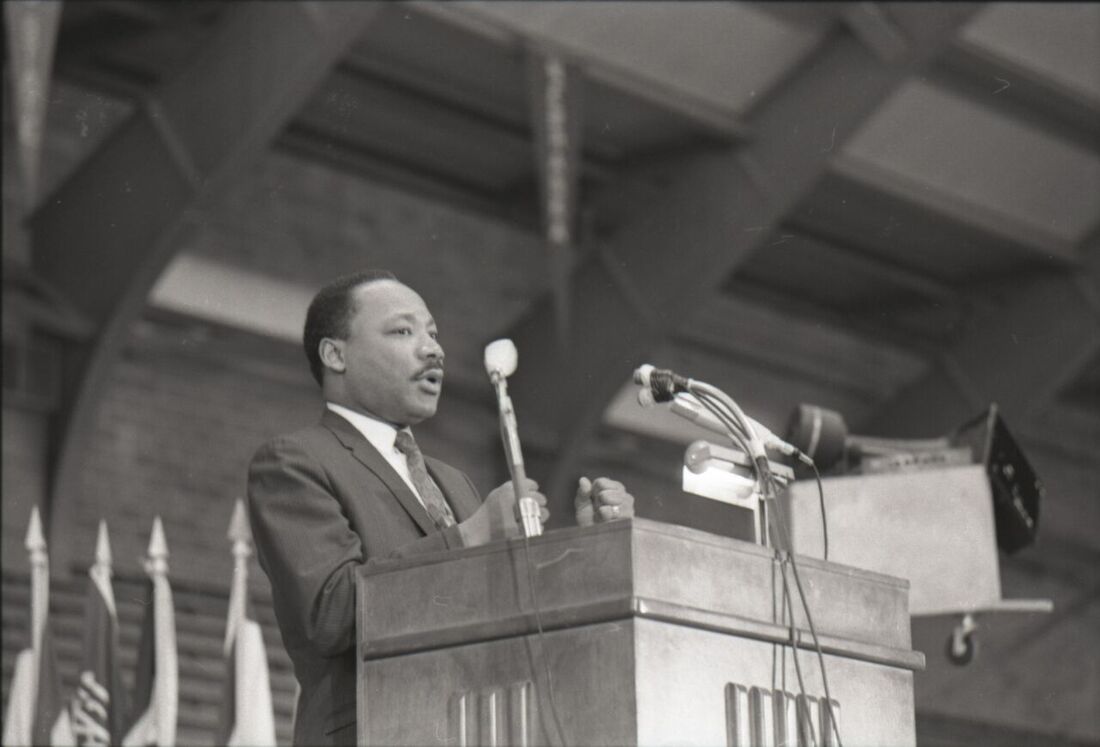But the year started with Dr. Martin Luther King, Jr. coming to Manhattan and Kansas State University on January 19th, speaking in Ahearn Fieldhouse to a packed crowd. The following are his opening remarks and, although 53 years have passed, they are certainly on target today.
“There seems to be a desperate, poignant question on the lips of thousands and millions of people all over our nation and all over the world. They are asking whether we have made any real progress in the area of race relations. In seeking to answer this question I always seek to avoid, on the one hand, a superficial optimism and, on the other hand a deadening pessimism. I always try to answer it by giving what I consider a realistic position. It seems to me that the realistic position is that we have made significant strides in the struggle for racial equality, but that we have a long, long way to go before the problem is solved." Read the full transcript here.
There is no better example of how his words a half century ago ring so true today than the all-too-frequent action of law enforcement in response to white backlash against the struggle for Black equality, safety, and justice. What happened in Washington D.C. on January 6th will be etched in history forever. Contrast the actions, or primarily inactions, of law enforcement that day with the often over reaction to a Black Lives Matter protest this past summer and it is abundantly clear that significant police reform is in order.
That double standard was certainly true in the 1960’s. Martin Luther King, Jr. was assassinated April 4th, 1968. Four days later, Congressman John Conyers from Michigan introduced a House Resolution to have an official federal holiday honoring the work of King. In the Kansas Legislative session shortly after King was assassinated, KS Representative Norman Justice introduced a resolution calling for the state to implement a MLK holiday for Kansas. No action was taken at that time. President Carter tried in 1979 to get the holiday established but came up five votes short in the House.
Final passage making the federal holiday official was not until 1983 (signed into law by President Reagan 11-2-1983) with 1986 being the first year of celebration. Kansas was an early state (1984) in adopting the holiday, with all states on board by the turn of the century. It is striking that, even now, Alabama and Mississippi honor the Confederate General Robert E. Lee on the same day as Dr. King. And we wonder why the symbolism of the Confederate flag is still such an issue.
Today, there is certainly opposition to needed police reform, just as there was strong opposition to the potential of a holiday for Dr. King. Republican Senator Jesse Helms of North Carolina said King was "anti-American." Some Senators said another holiday would be too expensive to the nation. To that, Republican Senator Dole of Kansas said, “I would suggest they hurry back to their pocket calculators and estimate the cost of 300 years of slavery, followed by a century or more of economic, political, and social exclusion and discrimination.”
I cannot imagine any Republican member of our current Kansas Congressional delegation uttering anything close to what Senator Dole said almost 40 years ago. How things have changed, and not always for the better, highlights the many challenges of race relations that we still face. So, on this year's MLK Day, we should heed Dr. King's words, and learn from his legacy, as we continue the struggle to make this a more just and inclusive nation. Because we certainly have "a long, long way to go."

 RSS Feed
RSS Feed